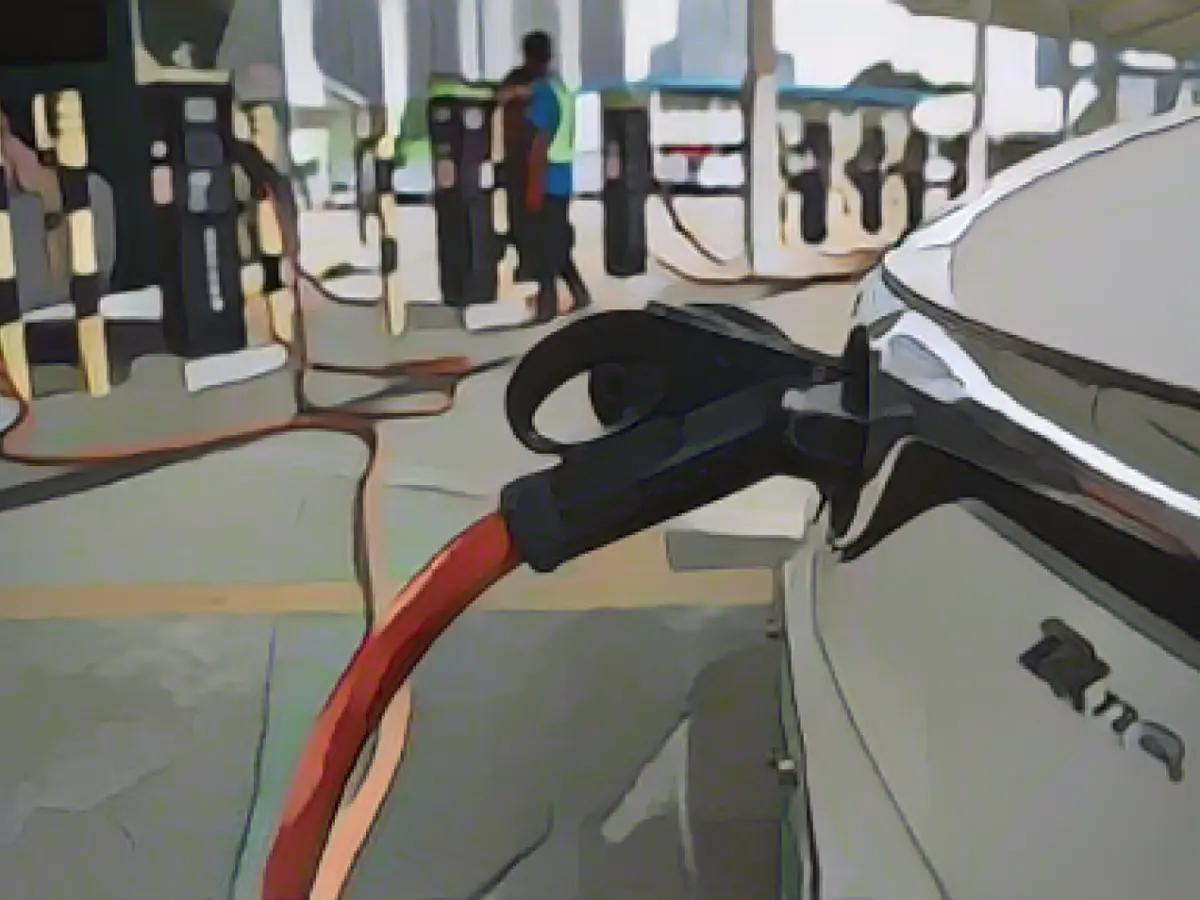Title: Reevaluating Electric Car Subsidies: Lindner Defends the Federal Ministry of Economy's Move
The abrupt announcement made by the Federal Ministry of Economy that e-car buyers had until midnight on Sunday to apply for the state purchase premium sparked controversy and criticism from political parties and consumers alike. The budget cuts were to blame for this sudden change, leaving tens of thousands of buyers uncertain about their future electric vehicle (EV) purchases.
Lindner Responds to Criticism
Despite criticism from the CDU and the SPD, the leader of the FDP, Christian Lindner, defended the decision to end the state purchase premium for e-cars by Sunday night. Lindner appeared on ARD's "Report from Berlin" to discuss the reasons for this sudden change.
The Minister's Justification
Budget cuts were the primary reason for ending the state purchase premium for e-cars, according to the Federal Ministry of Economy. Once the money was gone, no extensions or exceptions could be made.
The SPD's Critique and Call for Transition
The SPD, led by Detlef Müller, Matthias Miersch, and Verena Hubertz, criticized the sudden end of the state purchase premium as "extremely unfortunate" and called on Federal Minister of Economics Robert Habeck to organize a more reliable transition.
The Impact on Consumers
With the sudden end of the state purchase premium, car buyers had to pay several thousand euros more upfront for their electric vehicles. This surprise announcement left many in a state of uncertainty about their future purchases.
Environmental Concerns and Support for Domestic Industry
Ending the state purchase premium for e-cars has also drawn criticism from environmental groups, who argue that it will slow down Germany's transition to a sustainable transport system and could harm the country's goal of having 15 million fully electric cars on the roads by 2030. However, the Italian government's decision to end incentives for the purchase of foreign-made vehicles, particularly those from China, is aimed at reducing dependence on foreign production and supporting the domestic automotive industry.
The Future of Electric Vehicles in Germany
Going forward, the focus should be on creating a clear and consistent strategy for electromobility. Regional and community policies may provide alternative avenues for accessing incentives, making EVs more affordable for consumers.
In summary, the Federal Ministry of Economy's decision to end the state purchase premium for e-cars has sparked controversy and divided opinions. While this decision may slow down the adoption of electric cars in Germany, it presents an opportunity to reassess and strengthen the country's strategy for a sustainable transport system. The future of electromobility in Germany depends on a well-thought-out strategy that supports both the environment and the domestic industry.
Keep in Mind
- The abrupt end of the state purchase premium for e-cars could slow down EV adoption in Germany, but regional and community policies present an opportunity for alternative incentives.
- The sudden move has created uncertainty among car buyers, and the lack of a clear government strategy on electromobility has been highlighted by independent auto industry analysts.
- The Italian government's decision to end incentives for the purchase of foreign-made vehicles aims to reduce dependence on foreign production and support the domestic automotive industry.
- The EU is considering introducing harmonized incentives at the EU level to stimulate demand for electric cars and encourage energy transition across the EU.
- Consumer reactions to the sudden end of state subsidies in Germany have been mixed, influenced by political and economic factors.
Sources: , , and
Enrichment Data:
The sudden end of state purchase premiums for electric cars in Germany, as discussed in the context of Italy's similar policy change, has significant implications and reactions from both political parties and car buyers. Here are the key points:
Reasons for Ending State Purchase Premiums
- Economic and Strategic Motivation
- The Italian government's decision to end direct incentives for the purchase of electric cars is primarily driven by economic and strategic considerations. The aim is to prevent public funds from being used to incentivize the purchase of foreign-made vehicles, particularly those from China, and to support the domestic automotive industry instead.
- Reducing Dependence on Foreign Production
- The Italian government wants to reduce the flow of money for the purchase of electric cars from non-European countries, thereby strengthening the independence and competitiveness of Italian manufacturers.
- Structural Investments
- The funds previously used for tax breaks on individual private purchases are now directed toward structural investments such as battery production and charging infrastructure. This aims to make Italy a hub for electric mobility in Europe, reducing dependence on foreign production and creating new jobs in the green sector.
Implications
- Impact on Electric Car Adoption
- The end of state purchase premiums could slow down the adoption of electric cars in Italy and Germany, as consumers may face higher upfront costs without the financial incentives.
- Shift to Regional and Community Policies
- While direct government incentives are ending, regional and community policies may provide alternative avenues for accessing incentives. For example, some Italian regions like Lombardy and South Tyrol still offer local subsidies for the purchase of electric vehicles and the installation of home charging stations.
- Need for Clear Strategy
- The lack of a clear government strategy on electromobility has created uncertainty among automakers and consumers. This has been highlighted by independent auto industry analysts, who emphasize the need for consistent policies to support the transition to electric vehicles.
Political Party Reactions
- Italian Government
- The Italian government's decision to end direct incentives has sparked debate. Economy Minister Giancarlo Giorgetti has made it clear that the reform aims to support the domestic automotive industry and reduce dependence on foreign production.
- European Union Initiatives
- The European Union is considering introducing harmonized incentives at the EU level to stimulate demand for electric cars and encourage energy transition across the EU. This could include direct subsidies or other forms of financial support for consumers who choose to purchase electric vehicles.
Car Buyer Reactions
- Backlash Against Tesla in Europe
- In Europe, particularly in Germany and France, Tesla's sales have been negatively impacted by Elon Musk's controversial actions and statements. This has led to a backlash against Tesla, with some buyers considering selling their Tesla shares or thinking carefully before purchasing another Tesla due to Musk's behavior.
- Consumer Uncertainty
- The sudden abolition of state subsidies in Germany has created uncertainty among consumers. This has been compounded by high energy costs and excessive bureaucracy, making it challenging for consumers to transition to electric vehicles.
In summary, the end of state purchase premiums for electric cars in Germany and Italy is driven by strategic and economic considerations aimed at supporting domestic industries. While this decision may slow down the adoption of electric cars, regional and community policies can provide alternative incentives. The lack of a clear government strategy on electromobility has created uncertainty, and consumer reactions have been mixed, influenced by both political and economic factors.








